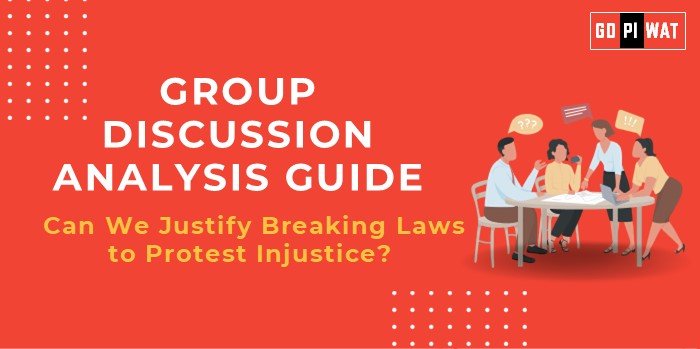📋 Group Discussion Analysis Guide: Can We Justify Breaking Laws to Protest Injustice?
🌐 Introduction to the Topic
- 🔍 Opening Context: Laws serve as the backbone of societal order, ensuring rights and responsibilities for all. However, history bears witness to individuals and groups breaking laws to protest perceived injustices, often altering the course of history—like the Civil Rights Movement in the U.S. or India’s freedom struggle.
- 📖 Topic Background: The debate on lawbreaking as a protest tool has roots in both ethical and practical realms. While Mahatma Gandhi championed civil disobedience, insisting on non-violence, critics argue that even noble intentions can create chaos if laws are broken. With global protests increasingly questioning authority, this remains a pressing concern for societies and policymakers.
📊 Quick Facts and Key Statistics
– 🌍 Global Protests: Over 130 major protests occurred worldwide in 2023, with 40% involving lawbreaking actions (source: Amnesty International).
– 🤝 Public Sentiment: 60% of surveyed citizens believe peaceful lawbreaking is justified under oppressive regimes (Pew Research, 2023).
– 📜 Historical Impact: Civil disobedience played a pivotal role in 70% of successful non-violent revolutions since 1900 (Harvard Study).
– 💸 Economic Consequences: Violent protests cost nations $15 billion annually, compared to $1 billion for peaceful protests (World Bank, 2023).
– 🤝 Public Sentiment: 60% of surveyed citizens believe peaceful lawbreaking is justified under oppressive regimes (Pew Research, 2023).
– 📜 Historical Impact: Civil disobedience played a pivotal role in 70% of successful non-violent revolutions since 1900 (Harvard Study).
– 💸 Economic Consequences: Violent protests cost nations $15 billion annually, compared to $1 billion for peaceful protests (World Bank, 2023).
🤝 Stakeholders and Their Roles
- ⚖️ Government Authorities: Uphold legal systems while addressing public grievances.
- 📢 Protesters and Activists: Advocate for change, often testing ethical limits.
- 🏛️ Judiciary: Act as an arbiter, balancing laws and rights.
- 👥 Citizens: Bear the social and economic consequences of lawbreaking.
🏆 Achievements and Challenges
✨ Achievements:
- 📜 Historical Reforms: Movements like the Indian independence struggle led to significant societal change.
- 🌍 Global Awareness: Protests like Extinction Rebellion highlight climate issues.
- ⚖️ Judicial Impact: U.S. Civil Rights protests led to landmark decisions like Brown v. Board of Education.
⚠️ Challenges:
- 🔥 Violence Escalation: Protests can devolve into riots, causing loss of life and property.
- 🤔 Public Opinion Polarization: Lawbreaking divides communities.
- 🌎 Global Comparisons: While peaceful protests succeeded in South Africa, violent methods in Venezuela led to prolonged crises.
📌 Case Study: India’s Salt March (1930): A symbolic yet illegal act challenged British colonial law and inspired global movements.
🧠 Structured Arguments for Discussion
- ✅ Supporting Stance: “Breaking unjust laws is a moral duty to uphold humanity, as history validates through Gandhi’s movements.”
- ❌ Opposing Stance: “Undermining laws destabilizes society and sets a dangerous precedent.”
- ⚖️ Balanced Perspective: “While lawbreaking has catalyzed progress, it must be deliberate, ethical, and last-resort to minimize societal harm.”
🎯 Effective Discussion Approaches
- 📜 Opening Techniques:
- 📖 Historical Insight: Refer to Martin Luther King Jr.’s “Letter from Birmingham Jail.”
- 💭 Philosophical Angle: Discuss Rousseau’s Social Contract and individual freedom.
- 📈 Statistical Emphasis: Highlight economic or social impacts of lawbreaking.
- 🔍 Counter-Argument Handling:
- Cite successful peaceful movements (e.g., Mandela’s strategies in South Africa).
- Argue that alternative legal methods like referendums exist for addressing injustices.
🔍 Strategic Analysis of Strengths and Weaknesses
- 💪 Strengths: Historical success, public mobilization.
- ⚠️ Weaknesses: Risk of chaos, alienation of neutral supporters.
- 🚀 Opportunities: Redressal of systemic injustices.
- ⚡ Threats: Misuse by extremist groups, erosion of rule of law.
🎓 Connecting with B-School Applications
- 🌟 Real-World Applications: Ethical dilemmas in leadership; case studies on social responsibility and public policy.
- ❓ Sample Questions:
- “What is your stance on lawbreaking in protest movements?”
- “Discuss the role of ethics in social change.”
- 💡 Insights for B-School Students:
- Study the balance between pragmatism and idealism in protests.
- Analyze how organizations handle public dissent ethically.


